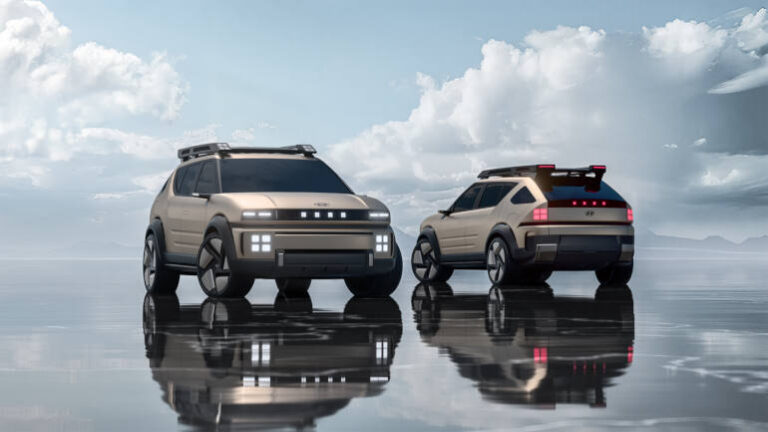Last month Hyundai Motor Company unveiled its INITIUM hydrogen fuel cell electric vehicle (FCEV) concept at its ‘Clearly Committed’ event held at Hyundai Motorstudio Goyang.
INITIUM is a Latin word meaning ‘beginning’ or ‘first’, representing Hyundai Motor’s status as a hydrogen energy pioneer and its commitment to develop a hydrogen society.
INITIUM provides a preview of a new production FCEV that Hyundai Motor plans to unveil in the first half of next year. The concept encapsulates the company’s 27 years of hydrogen technology development and reflects its clear commitment to achieving a sustainable hydrogen society.
This unique hydrogen fuel cell-powered SUV concept also marks the debut of Hyundai Motor’s new design language – called ‘Art of Steel’ – embodying the character of HTWO, Hyundai Motor Group’s dedicated hydrogen value chain business brand.
“Hyundai Motor’s clear, unwavering commitment to hydrogen over the past 27 years is rooted in our belief in its potential as a clean, accessible and therefore fair energy source for everyone,” said Jaehoon Chang, President and CEO of Hyundai Motor Company. “We are dedicated to pioneering a future where hydrogen is used by everyone, in everything, and everywhere. We invite you to join us on this journey.”
What is Hyundai’s new ‘Art of Steel’ design language?
At the unveiling, SangYup Lee, Executive Vice President and Head of Hyundai and Genesis Global Design, presented the INITIUM concept and Hyundai’s new ‘Art of Steel’ design language.
“Our challenge began from the manufacturing stage, where we pushed the formability of steel to the extreme to create a form of art,” Lee said. “With INITIUM, we’ve crafted a more SUV-like design that is both solid and safe, reflecting our dedication to our customers through ‘customer-centric design’.”
INITIUM’s iconic design integrates the HTWO symbol, representing Hyundai Motor’s vision for a future driven by hydrogen. The ‘+’ inspired graphic as part of INITIUM’s lighting signature blends with the bumper, creating a distinctive FCEV-specific design cue marked by unique lighting, solid volumes and refined elegance.
INITIUM’s distinct SUV-like aesthetic seamlessly integrates city living functionality with outdoor adventure capability with its bold lines and solid structure, balancing sturdiness and sophistication. The concept’s 21-inch wheels complement the overall design, with the vehicle’s rugged roof rack adding practicality for those with both urban and outdoor lifestyles.
INITIUM advances FCEV performance, comfort and safety
INITIUM’s development focused on three primary aspects: superior driving range and enhanced performance, which are key strengths of hydrogen cars; a spacious interior and luggage area, making it ideal for families; and unique convenience and safety features distinctive to hydrogen cars.
One of the biggest advantages of a hydrogen FCEV is impressive driving range and the flexibility this brings. With INITIUM, Hyundai Motor has equipped the concept with large hydrogen fuel tanks to maximize the vehicle’s range, enhancing the benefits of hydrogen FCEVs.
Hyundai Motor has also fitted INITIUM with aerodynamic wheels to reduce drag wrapped in low rolling resistance tyres, for a targeted driving range of more than 650 km[2] between refueling.
As for performance, INITIUM offers excellent acceleration and smooth overtaking capability. By further developing Hyundai’s fuel cell technology the company has increased the output of the stack and enhanced battery capacity, allowing for an electric motor output of up to 150 kW. This ensures drivers experience smooth driving in urban areas and at higher speeds on highways.
INITIUM delivers an impressive level of interior space and versatility suitable for a family SUV, with a large living space for second-row passengers that features seat backs with a large reclining angle for increased comfort. INITIUM’s wide body and large rear-door opening angle enhance convenience for rear-seat passengers when getting in and out of the car.
INITIUM includes a FCEV-specific route planner that addresses one of the biggest pain points for FCEV buyers: charging infrastructure. With this feature, users can easily plot an optimal route, finding charging stations along the way without having to access a separate app or make a phone call. Users can check the location accessibility and operating status of an identified charging station, as well as the number of waiting vehicles and therefore the possibility of charging.
In addition, INITIUM’s hydrogen fuel cell provides electricity without emitting any pollutants. This electricity can be used to power and charge various household appliances and personal devices via the concept’s Vehicle-to-Load (V2L) feature. Notably, the outdoor terminal is designed to connect directly to a 220V household outlet, transforming INITIUM from a means of transportation into a potential energy supplier.
In line with Hyundai Motor’s commitment to uncompromising safety, INITIUM has been developed to achieve top-tier collision safety and driving safety performance globally. To ensure ample safety for passengers in the event of a collision, the vehicle is reinforced with a multi-skeleton structure at the front, as well as a side body structure, and incorporates nine airbags, ensuring world-class collision safety performance.
Hyundai Motor plans to showcase INITIUM at the Los Angeles Auto Show and Auto Guangzhou in November, further solidifying its position in the global market as a hydrogen mobility leader. The production version of the INITIUM concept is set to launch in the first half of 2025.
Past, present and future: Hyundai Motor’s hydrogen vehicle development
In addition to the unveiling of INITIUM, Hyundai Motor hosted a Hydrogen Heritage Talk session, showcasing its 27-year history of FCEV development. The panel talk between executives allowed visitors to experience and engage with Hyundai Motor’s dedication to the development of FCEVs.
For the new millennium Hyundai Motor began its ambitious Mercury Project, aimed at bridging ground to industry leaders, and the Polaris Project, which focused on the independent development of the company’s core fuel cell stack technology.
Hyundai’s hydrogen evolution saw it become the world’s first automaker to mass-produce hydrogen FCEVs, introducing its first dedicated hydrogen fuel cell model in 2018. These FCEV development achievements highlight Hyundai Motor’s clear commitment to creating a better tomorrow.






